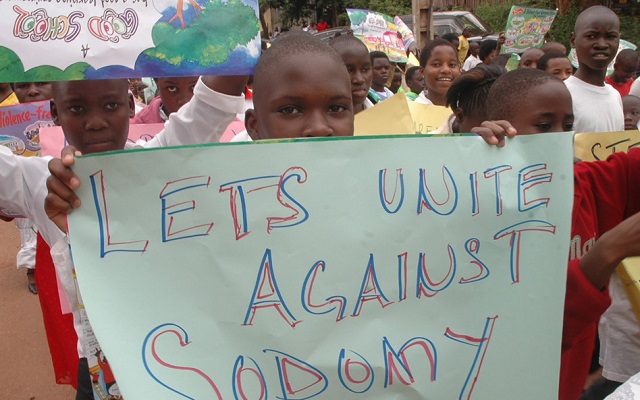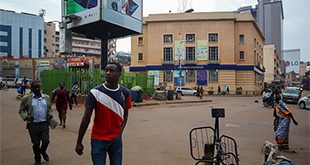
More than 30 African states already have laws that ban same-sex relationships.
Kampala, Uganda | AGENCIES | Human rights activists say Uganda’s passage of an anti-homosexuality bill could be the impetus for similar far-reaching legislation across Africa as anti-gay sentiments grow. More than 30 African states already have laws that ban same-sex relationships.
Ghana, for example, has recently introduced anti-LGBTQI bills before parliament in an attempt to criminalize consensual same-sex relationships.
U.S. Secretary of State Antony Blinken “urged the Ugandan government to strongly consider [the impact of] the implementation of this legislation,” saying via Twitter that the bill “could reverse gains in the fight against HIV/AIDS.”
White House press secretary Karine Jean-Pierre called the bill “one of the most extreme LGBTQI+ laws in the world.” National Security Council spokesman John Kirby did not rule out U.S. sanctions against Uganda, saying, if enacted, the bill could force “repercussions that we would have to take, perhaps in an economic way.”
Uganda’s just-passed Anti-Homosexuality Act is seen by human rights activists as a “revised and egregious” version of its 2014 Anti-Homosexuality Act, which was struck down by a court on procedural grounds.
The legislation, which President Yoweri Museveni has yet to sign into law, calls for lengthy prison sentences for people who identify as gay or are found to have promoted homosexuality. It establishes the death penalty for homosexual acts with minors, people with disabilities and several other groups.
Negative and dehumanizing rhetoric against Uganda’s LGBTQI community heightened as legislators debated the bill — and Museveni described gay people as “deviants.” Some supporters of the bill said it would make Uganda comport with God’s wishes.
Robert Akoto Amoafo, advocacy manager at Pan Africa ILGA (International Lesbian, Gay, Trans and Intersex Association), told VOA from Accra that the passage of Uganda’s anti-homosexuality bill is “worrying and concerning” for the LGBTQI community across Africa.
“This bill takes the basic rights of individuals across Uganda away from them by forcing them to report people, and then also forcing them to out their family members or friends or colleagues based on perception,” he said, noting that “this is one thing that most of the time we lose sight of.”
He said the bill would deepen discrimination in a country where LGBTQI persons already face punishment for having “carnal knowledge against the order of nature.”
“People don’t want to be associated with [homosexuals] because of the possibility of being tagged a criminal for not reporting. So, this clearly shows that the bill has gone beyond a homosexual issue to that of a human rights discussion.”
On March 9, Human Rights Watch said the bill, if passed, “would violate multiple fundamental human rights.”
Oryem Nyeko, a Uganda researcher at the international human rights organization, told VOA that he’s “disappointed” at the bill’s passage, describing it as “regressive.”
Nyeko said there’s high possibility of the bill becoming the norm across the continent because “historically, when one African country puts in place a repressive policy, other countries replicate it.”
“Politicians are distracting from the contemporary issues that are facing ordinary Ugandans by picking the low-hanging fruit — which is this idea of homosexuality being the cause of sexual abuse of children,” he said.
“I definitely see other politicians and other public figures in other [African] countries using the same tactic,” he added.
Some socially conservative groups applauded the Ugandan bill
Tony Perkins, president of Washington-based Family Research Council, tweeted that “Gender/Sexual ideology is not enshrined in international human rights treaties.” He decried the Biden administration’s response to the bill, writing, “It is inappropriate and coercive to shame countries for their traditional values.”
In Uganda, many fear the challenges sexual minorities already face will worsen. Eric Ndwula, a 26-year-old LGBTQI activist, told Reuters that his landlord issued him an eviction notice this month after a video of him being identified as gay went viral.
“I have been in this house for over four years. And I have never — no neighbor here could come and say that ‘You have recruited my child into homosexuality.’ Or by the mere fact that they are looking at a homosexual, they have become homosexuals.”
Museveni has yet to sign the bill into law amid calls by the international community, including the United Nations, to reject it.
Nyeko said despite Museveni’s past rhetoric against the LGBTQI community, the Ugandan president has been a “relative ally” toward the community.
“Just two years ago, Museveni declined to sign the sexual offenses bill which had similar provisions but not as extensive as this one,” Nyeko said, adding that “his [Museveni’s] argument was that the penal code already provided for that.”
 The Independent Uganda: You get the Truth we Pay the Price
The Independent Uganda: You get the Truth we Pay the Price



Rights activism is a ploy by the bully West to impose social imperialism on Africa. So sad that some African ‘elites’ have stooped so low to become vocal puppets of the West for the propagation of western moral vices in Africa due to money.